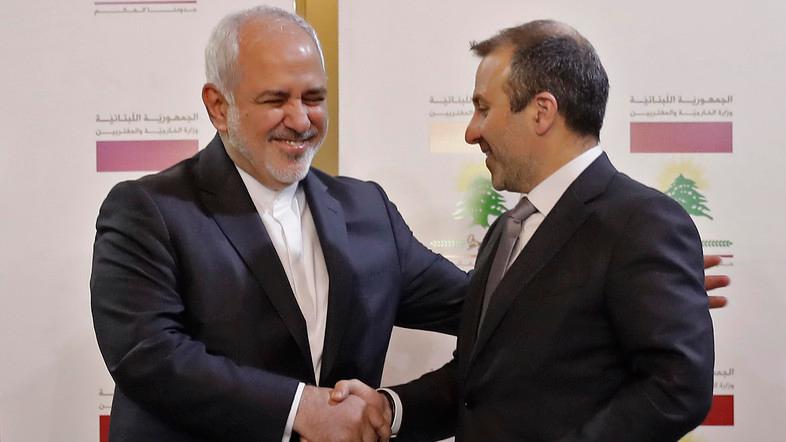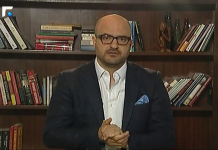Weakened by sanctions, Iran’s ‘aid’ to Lebanon reflects middle-aged delusions
مكرم رباح: مساعدات إيران للبنان اضعفتها العقوبات وهي تعكس أوهام القرون الوسطى
Makram Rabah/Al Arabiya/February 24/19
The Persians have a saying, that “a doctor must first cure his own balding head”. The phrase refers to the human propensity of preaching virtues to others, while personally disregarding them. This idiom seemed particularly applicable to Iran’s foreign minister, Mohammad Javad Zarif, who stirred up a storm during his recent visit to Beirut, when he cheekily remarked that sanction-hit Iran was willing to provide military and economic aid to the Lebanese state.
Iran’s ludicrous offer flies in the face of the fact that its own economy, as well as its military infrastructure, is in the midst of a financial crisis, due to rampant corruption caused by its autocratic clerical rule and crippling US sanctions.
Be that as it may, Lebanon should have welcomed Zarif’s generous offer, though the seemingly friendly gesture comes at a dangerous cost. The timing of Zarif’s visit raises a number of questions, as it coincides with the 40th anniversary of the Islamic Revolution, one that Zarif and members of his extended community in Lebanon, including Hezbollah, chose to celebrate at a lavish reception in one of Beirut’s swankiest hotels.
Ironically, located only a few meters from the site of the late Prime Minister Rafik Hariri’s assassination, this reception would draw Lebanon’s political elite, who hosted the 40th anniversary of the anti-West revolution as a public relations stunt, as well as to gain political legitimacy for the regime’s agenda for the region.
Zarif’s diplomacy is neither reflective of Iran’s decision-making process, nor its foreign policy, especially in the Levant. While Iran’s foreign minister might charm his audience with his pleasant, soft-spoken rhetoric and demeanor, the ultimate arbiter in Iran remains Supreme Leader Ali Khamenei. It is, in fact, Qasem Soleimani and his Quds Brigade that spread Iran’s sectarian and racist vison in the region. And this remains a dark vision that has proven disastrous, while leading many countries, including Lebanon, to the brink of political and economic collapse.
Iran’s ludicrous offer flies in the face of the fact that its own economy, as well as its military infrastructure, is in the midst of a financial crisis, due to rampant corruption caused by its autocratic clerical rule and crippling US sanctions
Makram Rabah
Thus, Zarif’s gift is nothing short of “political heresy”, as this offer to provide the Lebanese army with military hardware and training only aims to apply political pressure, and further alienate Lebanon from its main western ally, the United States. The Lebanese Armed Forces (LAF) remains one of the largest recipients, per capita, of US military assistance, totalling $1.7 billion in aid and equipment since 2007, due to a relationship which started almost three decades ago under the Regan administration.
Consequently, the LAF, as a western trained and equipped army, cannot simply switch its arsenal to an Eastern manufacturer, such as Russia or Eastern Europe, converting to the use of arms which Iran locally assembles and is of a largely inferior quality. Lebanese President Michael Aoun, a former commander of the LAF, purposely disregarded this basic fact and, instead of commenting on Zarif’s gesture, remained dubiously silent.
Aoun, a graduate of the Fort Sill Artillery School in Oklahoma, could have immediately shot down Zarif’s sinister offer by simply asking the Lebanese Defense Minister, who is a member of Aoun’s political party, to politely reject the so-called gift, thereby nipping this whole matter in the bud. Equally deafening is the silence of PM Saad Hariri, who has chosen to meet with Zarif and perpetuate the so-called diplomatic game both sides have played in the past. Zarif, and consequently his superiors, are very much aware that Hariri simply cannot afford to publicly attack or challenge Iran or Hezbollah, especially when it sends its honey-tongued diplomat, rather than its assassins.
The recently formed government makes Hariri hostage to his “sacred” alliance with Gebran Bassil, Lebanese President Michel Aoun’s son-in-law and Iran’s main Christian ally, thus placing difficult options for Hariri to overcome. He has to either commit to the economic plan for rescuing his country or stand up against Iran and its enduring hegemony over Lebanon.
Hassan Nasrallah had earlier paved the way for Zarif’s statement, by declaring his willingness to personally intercede with Iran to procure an air defense system for the Lebanese state to defend itself against Israeli aggression, thus severing its dependence on US protection. Nasrallah’s not-so-innocent pledge coincided with Hariri’s cabinet announcement that they had agreed on a ministerial statement, which tones down Hezbollah’s weapons and postpones confronting this thorny issue to another time.
Nasrallah simply wrote his own ministerial statement declaring that Lebanon is fully under Iran’s sway, and Zarif’s visit is meant to celebrate this obvious reality. Until Lebanon, itself, alters this bleak reality, Nasrallah and Zarif would be better off using their archaic weapons to protect their militiamen across Syria from continued Israeli sorties that have exposed Iran as nothing more than a balding bully, that is simply passing through a political midlife crisis.
*Makram Rabah is a lecturer at the American University of Beirut, Department of History. He is the author of A Campus at War: Student Politics at the American University of Beirut, 1967-1975. He tweets @makramrabah.




















